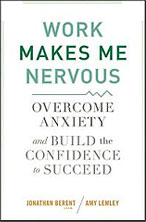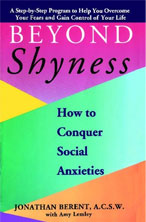Conversation Anxiety

In essence, in that particular situation you were selectively mute”choosing not to speak. Selective mutism is a vast, emerging problem (and clinical disorder) that impacts 6 out of 1,000 children and countless adults. It is an extremely misunderstood problem with very little effective help worldwide. The Diagnostic and Statistical Manual of Mental Disorders defines this disorder as “a persistent failure to speak in specific social situations where speaking is expected despite speaking in other situations.” (To listen to a free webinar about selective mutism, visit www.socialanxiety.com.)
Selective mutism is a syndrome in which a person stops talking in certain instances because of performance anxiety and an underlying obsessive worry. The selective mute is capable of speaking”and may do so in some situations such as at home. But the reflex”and it does become an automatic reflex”is to detach from thoughts and feelings and to avoid being verbal. It is obsessive, overwhelming, all-consuming, and unhealthy. (To hear an audio interview with pro baseball player Kurt Rueter about his daughter with selective mutism, visit www.socialanxiety.com.)
The selective mutism sufferer talks very normally in some situations, but does not talk in other situations, particularly if they involve spontaneous interactions. Is this anxiety? Obviously! Also present is obsessive worry about the process of talking and the compulsion to not talk in situations where performance pressure is experienced. Believe me, selectively mute children often grow up to be adults with a variation of this disorder. If ever there were an indicator or precursor for public speaking anxiety, which is the #1 phobia in the world, this certainly is it! Go to my website www.socialanxiety.com and you can listen to families and adults who have experienced this challenge. Ask yourself now: “Is my conversation anxiety characterized by obsessive worry about verbal interaction?” “When in the interactive situation to you fell almost addicted not to talk?” This is the “compulsion” to which I previously referred.
About Your Authors: A Productive Partnership
When it comes to conversation anxiety, no other coauthors can give you the perspective we can. Conversation anxiety”and related problems such as performance anxiety, workplace anxiety, social phobia, and social challenges”has been my specialty as a psychotherapist for 30 years.
The programs I have developed over the years are proven to work. You truly can overcome your conversation anxiety. And that’s where Amy comes in. Amy suffered from conversation anxiety”and has resolved it through the program I developed and present in both Work Makes Me Nervous and our previous book, Beyond Shyness. Her perspective throughout this book provides a unique way of nurturing you, helping you see your situation objectively so you know where you stand what you would like to change, and reminding you that it’s time to try something new. Both of us are here to ask you, “Why live another day in fear of talking with others?”
Amy puts it even more plainly. “Conversation anxiety is optional,” she says. “Once you understand what anxiety is and what triggers it, you can then choose to make a deeper commitment to your recovery through the in-depth learning program we present in Work Makes Me Nervous.”
Following the Work Makes Me Nervous program to the letter has made a lasting difference in her life. “When I began this program,” she says, “I knew that what I was doing”
feeling anxious, avoiding that anxiety, losing out on a fulfilling social life, squandering professional opportunities, and feeling terrible about myself”was robbing me of health and happiness.” Amy recognized that the only way to get out of her anxiety-ridden rut was, frankly” to get out of her anxiety-ridden rut! She told me something interesting: “A friend of mine always said, ‘If you always do what you’ve always done, you’ll always get what you’ve always gotten.’ That’s where I stood, and that is where our readers stand now. If you want to stop feeling anxious before, during, and after conversations, you have to change.”
Both of us are here to tell you that you can.
The Many Faces of Conversation Anxiety
Carla had a great job in marketing services at a major electronics distributor. At 25, she had already earned an MBA and was poised for a promising career. Since birth, she had had a condition that scratched her vocal chords, leaving her with a deeply hoarse voice that people often mistook for laryngitis. Much of her time spent in marketing involved conference calls and face-to-face meetings. It seemed like any of the times she talked with a new contact, the person would hear her voice and express sympathy that Carla had a cold. “Sorry you’re sick.” “Hope you feel better soon.” Self-conscious about her voice, Carla began to avoid necessary conversations in favor of e-mail and texting. Eventually, her supervisor addressed this with her, explaining that in her position, it simply wasn’t acceptable not to talk in person. She considered leaving her job despite an economy in which good jobs were scarce and companies simply weren’t hiring in her field.
Saras was proud of her son. He was an elementary school math whiz who had been tapped for a prestigious gifted and talented program. She and her family had moved to the United States from India when Bidhan was only three, and it had amazed her how quickly her little boy had adapted. She had not fared as well. Although her command of English was excellent, her confidence was low. She isolated herself from people outside the Indian community in the city where she lived. When parent“teacher conferences came around, she made excuses why she could not keep her appointment. The school year was about to end, and she had yet to meet with the teacher.
Andrew was a PhD candidate in history at a Midwestern university who planned to become a professor once he completed his dissertation. Early in the program, he had excelled as a research assistant for two different internationally recognized scholars. Both of these professors had encouraged Andrew in his work and considered themselves his mentors. But Andrew’s bright star began to fade when he failed to complete his doctoral dissertation”a book-length research paper. Most candidates were ready to “defend” their dissertation before the department committee within three years of entering grad school. But Andrew’s work had stretched on for five years and he was at risk of being asked to leave the program. Andrew had begun avoiding conversations with the two professors who had been his champions for so long. He was angry at himself and embarrassed for the way he was behaving. What was the cause? He was terrified to complete his project and then have to face the committee of five professors who would formally ask him questions about it. And that fear was about to ruin his academic career.


